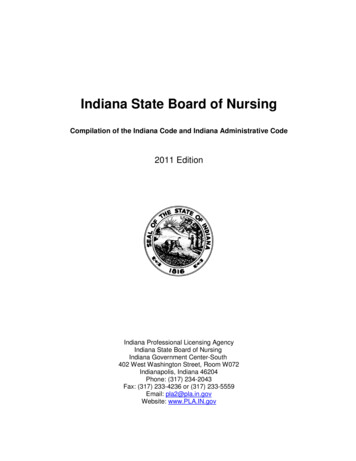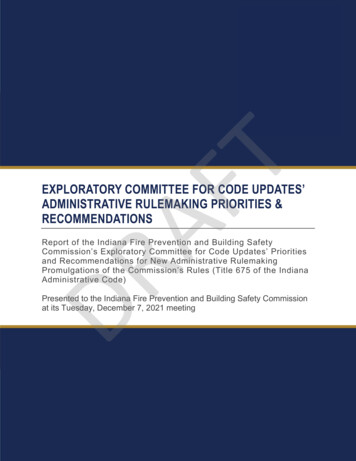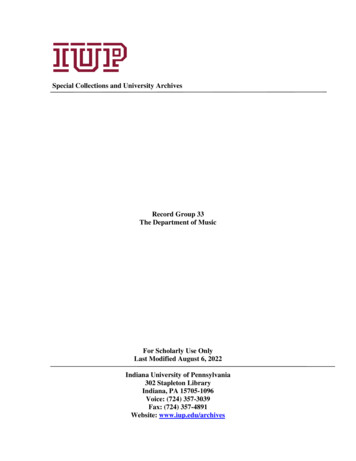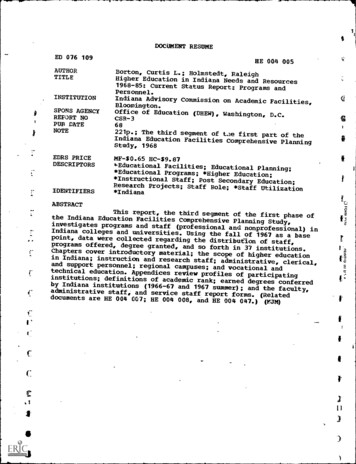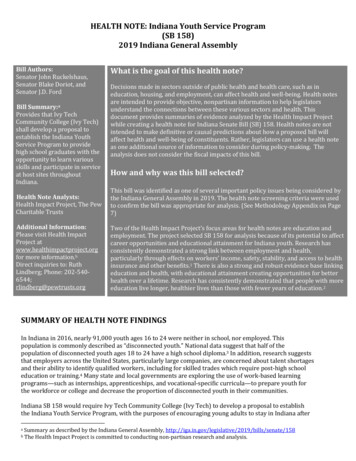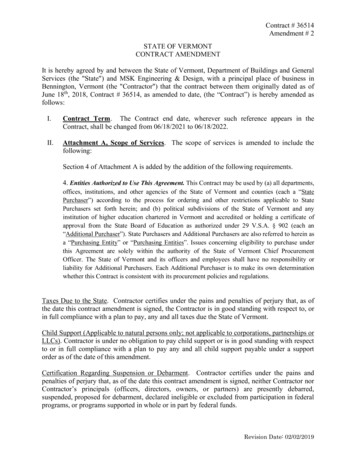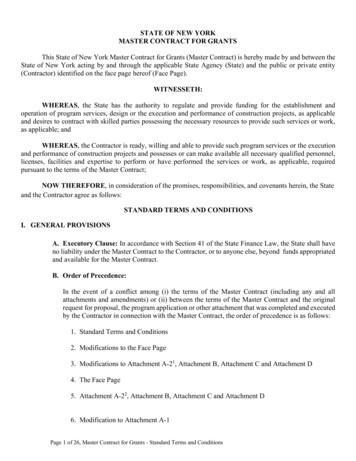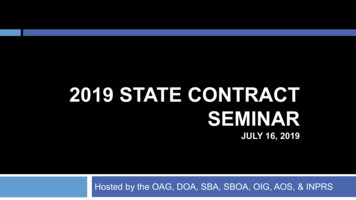
Transcription
2019 STATE CONTRACTSEMINARJULY 16, 2019Hosted by the OAG, DOA, SBA, SBOA, OIG, AOS, & INPRS
WHERE DO I EVEN BEGIN?
MISTY MERCER BACK IN THE DAYSTEPHANIE MULLANEY TODAY
STATE CONTRACTS IN ONE SLIDEThey must be in writing.Selection of the contractor or the grantee must be made inaccordance with statute or regulation.As required by IC 4-13-2-14.1, they must be approved by: IOT (if technology is involved) IDOA State Budget Agency Office of the Indiana Attorney GeneralThey must contain certain provisions.They cannot contain certain provisions.Everything you generally need to know is found on IDOA’sContract Administration intranet inistration.stm
INDIANA DEPARTMENT OFADMINISTRATIONERIN KELLAM, DEPUTY COMMISSIONER PROCUREMENTTAMMY GLICKMAN, DEPUTY GENERAL COUNSEL
Role of IDOAWhat are some of the things IDOA does? Leasing Division: Establishes uniform standards for determining amount and type of facilities needed byagencies; assign facilities in or on property owned or leased by the State; with the approval of theGovernor, lease facilities for the use of agencies.Public Works Division: Manages almost all of the building construction and maintenance projects forthe state of Indiana.Procurement Division: Acts as the purchasing agent for state agencies and sets policies andprocedures for all state agency purchasing (except for INDOT, quasi-agencies, other elected offices).Procurement does advise those excepted.Contracts: Supervises and regulates the making of contracts and grants, negotiates contracts andassists to resolve contract/grant disputes as requested;Division of Supplier Diversity: Provide equal opportunity to Minority, Women and Veteran BusinessEnterprises in the state’s procurement and contracting process.
Procurement and ContractsWhere do I start?Procurement Training & Resourceshttp://www.in.gov/idoa/2864.htmElectronic Contractinghttp://www.in.gov/idoa/2864.htmStay informed sign up for SCM Newsflash updateshttp://www.in.gov/idoa/2864.htm
ProcurementCan I just purchase whatever my agency needs? IDOA is the official procurement agent for all executivebranch agencies. IC 5-22-4-1State agencies have delegated procurement authorityunder specific dollar amounts.Any amount over agency delegation - IDOA ProcurementDivision is responsible for the bidding process.
Request for Proposal (RFP) ProcessWhat is an RFP? Primarilyused for contracts above 75,000 Entire process can take 6-9 months Most often used for services Considers cost and quality Award based on most responsive/best value to the State Advertised in publications for 2 weeks “On the street” for 3-4 additional weeks Evaluation criteria is identified in the RFP See IC 5-22-9
Special Purchasing MethodsWhat is the process to request a Special Procurement? IC 5-22-10 Send request via email - idoaspecprocreq@idoa.IN.gov Include DWD and DOR clearances Required for: “Zero Dollar” Amendments Contract to exceed the 4 year limit (IC 5-22-17-4 and25 IAC 1.1-1-16(c))
IDOA’s Division of Supplier Diversity (DSD)What does the DSD do? The Division was established in 1983 and is currentlyhoused within the IDOA. Promote, monitor, and enforce the standards forcertification of Minority and Women Business Enterprises. November 2018 – IVOSB is added to DSD’s mission. Provide equal opportunity to Minority, Women and VeteranBusiness Enterprises in the state’s procurement andcontracting process.
M/W/VBE Participation Goals
IDOA APPROVAL PROCESSHow can I make sure my contract/grant is approved by IDOA? Your procurement method is well documented and meets IDOArequirements (IC 5-22 and 25 IAC 1.1)You are using SCMYou are using the TEMPLATES approved by IDOA & OAG, andmaybe you have your contract or grant Form Approved Changes to the boilerplate are clearly identified in Section 50.State Boilerplate Affirmation Clause
IDOA APPROVAL continuedIs there anything else I should check before submitting to IDOA? Are the exhibits properly labeled, referenced in the contract andattached?Are the deliverables clearly defined? (25 IAC 1.1-1-16(b))Does the Consideration ( ) add up correctly?Are all signatures present?Are all of the required clearances (SOS, DWD and DOR) uploadedinto Supplemental Documents? (Sec. 10.C of the Contract, IC 522-16-4, and IC 4-13-2-14.5)
Helpful Tools for ContractingWhere can I find more information? Professional Services Contract Manualhttps://www.in.gov/idoa/3000.htm Current versions of contract, grant, amendment & legation of Purchasing Authority Program (DPAP) Manual–updated g DPAPManual.pdf
Contracting TemplatesWhere can I find the contracting templates? All of the templates are in SCM (Supplier ContractManagement) WORD versions of the most commonly used templates onIDOA’s website - https://www.in.gov/idoa/3000.htm
INDIANA OFFICE OF TECHNOLOGY APPROVALHOW DO I KNOW IF IOT APPROVAL IS REQUIRED WHEN SETTING UP THE CONTRACT? IOT must review and approve all contracts involving information technology hardware: anything with a processor,including computers, tablets, scanners, printers, mobile or portable devices of all types, and peripherals.IOT must review and approve contracts involving software, software development, and software support andmaintenance, all database or software as a subscription contracts, all contracts involving “the cloud”,IOT must review all contracts involving telecommunications.WHAT IS IOT LOOKING FOR? IOT reviews to ensure that the IT products and services that you purchase are “compatible” with all IOT policies andstandards, including accessibility standards as set forth in the contract boilerplate, and for “compatibility” with relevantstate systems and programs. If a particular policy or standard is not applicable to your IT product or service, then yourIT product or service is necessarily “compatible” with that policy or standard.IOT approval of Grants involving information technology is delegated IF the grant (1) has the standard boilerplateaccessibility language, and (2) is accompanied by the delegation Memo posted with the templates on IDOA’s intranetsite.
IOT – CLOUD CONTRACTSI’VE BEEN TOLD A CONTRACT I’M DOING INVOLVES “THE CLOUD.” WHAT IS THAT –AND IS THERE ANYTHING SPECIAL I SHOULD BE AWARE OF?“Cloud computing” is the practice of using a network of remote servers hosted on the Internet to store,manage, and process data, rather than a local server or a personal computer. IOT must approve all cloud contracts. Agencies are urged to involve IOT in cloud projects as earlyas possible.IOT has three different sets of cloud terms that are intended to protect the State and its data: one forSaaS, one for PaaS, and one for IaaS. They can be found with the contract templates on IDOA’s websiteat https://www.in.gov/idoa/3000.htm. IOT intends to consolidate all three into a single template during thesummer.IOT’s cloud terms are commonly used with smaller or less sophisticated vendors that don’t have thesecurity policies and protections of the Amazons and Microsofts; the State’s risk of harm or loss with suchentities is greater. The terms should be included as an exhibit to any cloud contract unless you haveexplained to IOT in writing why your vendor cannot accept some or all of the terms. The greater the riskof harm associated with the deal, the more detailed your explanation should be.
INDIANA ATTORNEY GENERAL’S OFFICESusan Gard, Deputy Attorney General, OAGKevin McDowell, Assistant Chief Counsel, OAG
OFFICE OF THE ATTORNEY GENERAL (OAG)I know what IDOA reviews for – what role does the OAG play in thisprocess? The OAG reviews for form and legality: “The attorney general must review for form and legalitycontracts to which a state agency is a party” and, if the contract “does not meet the requirements oflaw”, the OAG must disapprove the contract in writing and “assist the agency to remedy defectsthat are found, if possible.” IC § 4-13-2-14.3 The OAG has 45 days to review; if the OAG does not respond within 45 days of submission, thecontract is deemed approved. The OAG is always the last step in the process – it will always be approving the final document towhich all other parties have agreed.20
OAG Review – Behind the Scenes The Advisory Section of the OAG is responsible for all matters relating to contracts. Molly Skarbeck is Advisory’s Contract Manager. All SCM contracts route to her first. Mollythen deals them out like a deck of cards to the Deputy Attorneys General (“DAGs”) whoreview and approve them. 11 DAGS review contracts and requests for form approval – in addition to all of their otherduties. They strive to have contract approvals done within 2 weeks. The Advisory Chief Counsel Approves Contracts over 10 Million and approves contractsfor outside counsel All of the OAG reviewers check to make sure that referenced Exhibits are attached, that theterm and consideration amounts are consistent, and – in the case of an amendment – thatthe underlying contract has not already expired.21
TEMPLATES - II know from law school what a contract is and what it should contain, butI’d really feel better seeing what some other state contracts look like. Anysuggestions?Uniformity and Consistency are Key to the Success of the State Contracting Process. Well over10,000 contracts and grants flow through the system each year.The reviewing agencies CANNOT do their jobs quickly andefficiently without considerable standardization.The OAG and IDOA have developed templates to be used asthe basis for contracts or grants.
TEMPLATES IIUpdated templates are automatically loaded into SCM. They can be viewed in Word format onIDOA’s contract management website: http://www.in.gov/idoa/3000.htmStandard templates include those for: Professional Services Grants Educational Institution Contracts Amendments Addendums Outside Counsel ContractsALWAYS USE THE CURRENT TEMPLATES!You may customize a template for use by youragency, but please coordinate with IDOA and OAG.
THE ADDENDUM TEMPLATEWHAT IS THE ADDENDUM TEMPLATE USED FOR? A vendor may present its form contract for the State to sign. This is particularly common intechnology contracts.NEVER SIGN THE VENDOR’S FORM CONTRACTUSE THE STATE’S ADDENDUM The Vendor’s form contract always has clauses that are in the Vendor’s best interest, not theState’s; it likely contains clauses that are not legal in State contracts (i.e., governing law,indemnity, arbitration, payment of fees and costs).Regardless of what the Vendor’s Account Executive says, the Vendor’s boilerplate terms arenegotiable
More about the AddendumWHAT SHOULD I BE AWARE OF IN THE ADDENDUM? It must always take precedence over the form contract. The first paragraph provides: “Anyinconsistency, conflict, or ambiguity between this Addendum and the Form Contract shall beresolved by giving precedence and effect to this Addendum.”It has a list of terms and conditions that the State cannot agree to and that the Vendor mustagree are deleted from its form contract.The Addendum has terms and conditions that are required by law to be in contracts to whichthe State is a party or in which public funds are spent.Always take the time to read the vendor’s form contract; it often has business terms that areimportant for your client to be aware of.
AMENDMENTSOur contractor has changed its name and asked that all future payments bemade payable to the new name. Is there anything I need to do?Any time you are modifying a contract to change the amount of consideration, to change the term,to change the scope of work, to change the name of the vendor:DO AN AMENDMENT AND ROUTE IT THROUGH THE APPROVAL PROCESS.The current amendment template will also include any mandatory clauses resulting from statutorychanges.An expired contract cannot be amended; a new contract must be done. A contract is deemedexpired if the amendment is not signed by the vendor on or before the expiration date.
STATE BOARD OF ACCOUNTSBeth Kelley, State Audit Director
Grant Agreements How do I know if I should use the Grant AgreementTemplate or the Professional Services Contract Template? ProfessionalServices Contract Manual www.in.gov/idoa/3000.htm Characteristics Transferof a Grantof money, property, or anything of value to a recipient for a specificpurpose. The State's role in how that purpose is achieved is passive – meaning therecipient decides how to accomplish the purpose. Example – The ISHD gives 20,000 to ABC Not for Profit to administer aprogram to educate the communities on how vaccines work.
Grant Agreements How do I know if I should use the Grant AgreementTemplate or the Professional Services Contract Template? Characteristics Buyof a Contractor lease property or service for the direct benefit of the State. The State maintains control over how service is performed and what propertyis purchased. Example – The Indiana Department of Correction contracts with Ray's TrashService to provide trash removal service at the correctional facilities. Subrecipient Checklistand Contractor Determination Formto help you make the determination
Grant Agreements I have a Grant Agreement with the City ofGreenwood. Why do I need to tell them the funding sourcein Section 1 of the Grant Agreement? Grantees Federaluse that information for their reporting purposes.Source versus State Source Audit requirements Important that the grant information included in the grant agreement matchesthe funding source that is used in Peoplesoft.
Grant Agreements I have a Grant Agreement with ABC Not for Profit to givethem 20,000 to administer a program to educate thecommunity about vaccines. Since it's only for 20,000, doI need to leave Exhibit C in the agreement? ExhibitC informs the recipient of their requirements to file an E-1with SBOA. Dollar amount doesn't matter. Only dollars given as a grant not as a vendor Only Non-Governmental units
HOW IS THE STATE DIFFERENT FROM A PRIVATECONTRACTOR?WHY ARE WE SO RIGID ON CONTRACT TERMS AND CONDITIONS AND HOW ARECONTRACTS PROCESSED? HOW DO I EXPLAIN THIS TO THE VENDOR? The State is a sovereign. It has the power to do everything necessary to govern itself,including making and applying its own laws and controlling its own affairs.Vendors doing work for the State are paid using public funds – taxpayer dollars. The GeneralAssembly has determined how vendors must be selected and set an approval process thatmust be followed in order to commit public funds. It has also determined that specific terms orconditions relating to state contracts are in the best interest of the public. For example -Contract claims against State must be tried to the court, not a jury (IC § 34-13-1 (b)), areappealed directly to the Indiana Supreme Court (IC § 34-13-1-5), and judgments againstthe state accrue interest at 6% (IC § 34-13-1-6).
PROVISIONS THE STATE CANNOT AGREE TOHow do I know what the State cannot agree to? The Addendum has a list provisions (lettered A – N following paragraph 3)frequently found in Vendor contracts that are NOT acceptable to the State.These same provisions cannot be added into a State contract.What explanation can I give a vendor for why some of theseprovisions cannot be part of a contract with the State?
Governing LawThe Vendor’s headquarters are in Illinois. Why can’t we agree tolitigate disputes there? It isn’t that far.Indiana is a sovereign state. Our contracts are governed by Indiana law. We donot submit to the jurisdiction or governing law of another State.* See generally IC § 34-13-3-1 [contracts] and IC § 34-13-3-2 [torts], which provide that these statutesauthorizing suit against the State “shall not be construed as:(1) a waiver of the eleventh amendment to the Constitution of the United States;(2) consent by the state of Indiana or its employees to be sued in any federal court; or(3) consent to be sued in any state court beyond the boundaries of Indiana.”This clause may only be deleted “by mutual agreement of the parties” if the agreement is with anotherstate.*See IC § 5-33.5 for agreements with federally-recognized Indian tribes.
Confidential ContractsThe vendor wants to keep its pricing and terms confidential.Why can’t we agree?The State can only agree to keep information receivedunder a contract confidential to the extent that theinformation is confidential under the Indiana Accessto Public Records Act (APRA), IC § 5-14-3Pricing and terms of a contract with the State are nota “trade secret” exempt from disclosure under the Accessto Public Records Act.Public Contracts are posted on the State’s website asrequired by IC § 5-14-3.5-2.
Payment TermsThe Vendor wants a down payment of 25% when the contract is signed.After that, it wants payment 10 days after invoice, with interest at 18% onlate payments. Is that a problem? Unless authorized by statute, we can’t spend public funds until we have received thegoods or services. IC § 4-13-2-20 lists specific exceptions under which payment inadvance may be made.IC § 5 -17-5-1 provides that payments are timely if made within thirty-five (35) days of:(A) receipt of goods and services; or(B) receipt of a properly completed claim.The State pays interest only at rates authorized by statute: 1% per month on invoicespaid after 35 days (IC § 5-17-5-1), 6% per annum on unpaid judgments (IC § 34-13-16).
Dispute ResolutionThe vendor wants to arbitrate disputes – why can’t we agree tothat? Agency budgets do not typically have funds appropriated to pay for mediationor arbitration. The templates have a provision for resolution of disputes throughIDOA.Arbitration can subject the state to a non-judicial judgment.While the State can and will agree to court-ordered mediation,it is not something that can be agreed to in a contract.But see IC § 5-33.5 if the agreement is with a federallyrecognized Indian Tribe.
IndemnityWhy can’t the State agree to indemnify, defend and holdharmless the vendor? These concepts involve an allocation of financial risk in a tort action. The Indiana TortClaims Act (IC § 34-13-3) defines claims for which the State is immune, has a particularprocedure to be followed in making a claim, and sets limits on recovery against the State.It also has a continuing appropriation to pay judgments or settlements against the State.Indiana Constitution, Article 10, Section 3, provides “no money shall be drawn from theTreasury, but in pursuance of appropriations made by law.” Money is notappropriated to pay the costs, judgments, or other expenses of non-state entities.There is confusion over the use of the word “indemnity” as opposed to assumingresponsibility for one’s own negligence. The State can agree to be responsible for its ownnegligence or other tort liabilities for which it is legally responsible.
InsuranceThe Vendor wants us to provide insurance. Where do I get acopy of our policy?Laws prohibit the State from purchasing insurance: IC 4-13-1-17. Insurance; loss or damage to property(a) A state agency may not purchase insurance to cover loss or damage to property.IC 34-13-3-20. Liability insurance; prohibitions*(b) The state may not purchase insurance to cover the liability of the state or its employees.If a Vendor seeks either indemnity or insurance coverage from the State for a potential claimarising in tort, it must look to the Indiana Tort Claims Act, IC § 34-13-3, and the Vendor shouldfamiliarize itself with the procedures and liability limitations set forth in that Act.* There are narrow exceptions – read the statute.
Statute of Limitations and Time to Bring a ClaimThe Vendor has asked for all claims to be made within 6 months and suit tobe filed within 1 year. What’s wrong with that? The General Assembly has set how long a person has to bring a suit on a contract: 2, 6, or10 years depending on the contract. See IC § 34-11-2, et. seq.The OAG (which will either commence or defend the suit) will rely on the statute and cannotreview each individual contract to see if the statute of limitations has been modified.The State Board of Accounts needs time to complete its audit (which may be every twoyears in some cases) and determine if there are irregularities.
Payment of Taxes, Court Costs, and Attorney FeesThe Vendor wants us agree to pay taxes on the purchase. Does the Statedo that? The State is exempt from most state and many federal taxes (see, e.g., IC § 6-2.5-5-16exempting the State from paying sales tax). If the vendor’s form contract requires you tofurnish a copy of our tax exemption certificate in order for the transaction to be considered taxexempt – be sure that certificate is in fact provided to the Vendor.The Vendor asks that the prevailing party pay the other’s costs andreasonable attorney fees. Can we agree to do that? The State cannot agree to any provision requiring the State of Indiana to pay penalties,liquidated damages, interest or attorney’s fees. IC § 34-52 sets out the limited circumstancesin which fees and other expenses may be awarded against the State.
REQUIRED CONTRACT PROVISIONSOur templates have a LOT of boilerplate clauses. Some of them Ican understand from going to law school. But some of themseem a bit unusual.Our statutes and executive orders require that some clauses be in every contractto which the State is a party or in which public funds are being spent.What explanation can I give a vendor for why some of theseprovisions cannot be part of a contract with the State?
Funding CancellationWhat is the Funding Cancellation clause about? Does that meana vendor won’t get paid?Financial Management Circular 2007-1 (which derives from IC § 5-22-17-5) requires the clauseto be in every contract that the Budget Agency approves.“Funds not appropriated or not available; cancellation of contract(a) When the fiscal body of the governmental body makes a written determination that funds arenot appropriated or otherwise available to support continuation of performance of a contract, thecontract is considered canceled.”It does not mean the vendor won’t be paid for work already performed or goods provided. Itmeans that the vendor cannot claim damages for early termination or anticipated income if thereis no money available going forward.The federal government and most states have similar provisions.
STATE BUDGET AGENCYSola Egunyomi, Assistant Director, State Budget Agency.
How does the Contract approval process work at SBA?IDOA/IOTEDS ContractsOnly: SBA FrontOfficeBudget Analyst responsible foragency reviews(and signs)Division Directorreviews (and signs)Deputy Directorreviews (and signs)AttorneyGeneralBudget Directorreviews and signsEDS ContractsOnly: SBA Front45
What are the “Fiscal Issues” SBA is looking for in acontract? Financial impact of the contract to the agency Total cost of contract, fiscal year by fiscal yearimpact, funding sources, etc. Impact of contract to the agency’s budget andspending plan, CFO sign off Cost per unit, per hour, per product, etc. SBA will work with agency financial staff orcontrollers to understand the financial impact ofthe contract46
What are the specific clauses SBA requires in aContract? Funding cancellation FMC 2007-1 requires that all contracts contain the following language:“When the Director of the State Budget Agency makes a written determination that funds are notappropriated or otherwise available to support the continuation of performance of this contract, thecontract shall be canceled. A determination by the Director of the State Budget Agency that fundsare not appropriated or otherwise available to support the continuation of performance shall be finaland conclusive.” IC 5-22-17-5Funds not appropriated or not available; cancellation of contractSec. 5. (a) When the fiscal body of the governmental body makes a written determination thatfunds are not appropriated or otherwise available to support continuation of performance of acontract, the contract is considered canceled.(b) A determination by the fiscal body that funds are not appropriated or otherwise available tosupport continuation of performance is final and conclusive.As added by P.L.49-1997, SEC.1.47
Specific key clauses (To be continued) Other Key Clauses SBA Considers. Terminationfor convenience (While not mandatory, inclusion ofthis clause is highly recommended) Out clause (normally with leases) Performance measures, outcomes, service levels, penalties Consideration and Term (make sure they are clear and match theEDS, other attachments) Renewal Options, Payments (35 days in arrears)48
How can I expedite the contract review process? Large policy or dollar amount contracts coming through forapproval Ifthe agency has a high priority contract coming through, or willbe coming through for approval, advanced notice and informationis helpful to SBA Working with SBA staff before a major contract, or high prioritycontract, comes through for approval can cut down on reviewtime in SBA49
How is the MOU review process different from theContract review process?A Memorandum of Understanding (MOU) between twostate agencies must be reviewed and approved by SBA SBA review and approval of MOUs are required by FMC2009-2 The same policies concerning approval of contracts bySBA apply to MOUs 50
Drug-Free WorkplaceWhy do we have to use this Drug-Free Workplace language? Can thevendor substitute the federal language it typically uses? The language is taken directly from Executive Order 90-5, which is available on-line on IDOA’scontract management webpage along with the contract templates. It applies to “private legalentities receiving grant or contract funds” from the State and applies to the Contractor’sworkers in Indiana. Federal language may not be substituted; sometimes you may need to include both. Only the first paragraph is required when the contract is under 25,000.
Telephone PrivacyThe vendor doesn’t do telemarketing and doesn’t think thisclause is necessary.If the vendor is being paid, this clause must be in the contract.“IC § 5-22-3-7. Prospective contractors required to make certifications concerningdeceptive acts and telephone privacy; sanctions(a) This section applies to every use of funds by a governmentalbody. (b) A prospective contractor may not contract with agovernmental body unless the prospective contractorincludes the following certifications as terms of the contractwith the governmental body: ”
Non-DiscriminationThe vendor has different language it uses and is required byfederal law. Why isn’t that enough? Indiana Code § 22-9-1-10 requires the language in the boilerplate to be in“[e]very contract to which the state or any of its political or civil subdivisions isa party.”Federal non-discrimination contract provisions may be different or moreexpansive. It is not unusual to use both clauses in a contractinvolving federal funds
E-VerifyThe vendor’s quote doesn’t include the cost of enrolling in thisprogram. Plus, they check their employees another way.IC § 22-5-1.7-11 provides (in part)“A state agency may not enter into or renew a public contract for services with a contractor unless the public contract contains a provision requiring the contractor to enroll in and verify the work eligibility statusof all newly hired employees of the contractor through the E-Verify program ” E-Verify is fast, free and easy to use – and it’s the nationally recognized method for employers to ensure alegal workforce. It is required only in contracts for services.Use of E-Verify is required in federal contracts for services. If your vendor verifies eligibility at all, they arelikely already using E-Verify.You can see if your vendor is enrolled by visiting the e-verify verify-data/how-to-find-participating-employers
Non-Collusion and Acceptance AffirmationWhat is this clause all about?This provision, derived from Indiana Code § 5-22-16-6, must be in every contract,grant, addendum, and amendment.The Contractor affirms, under the penalties of perjury, that the person signing hasthe authority to bind the Contractor, and affirms that the Contractor has notengaged in anticompetitive or other illegal activity in procuring the contract.
FORM APPROVALSThe person that gave me this contract to work on said to get itright because there will be 25 more just like it. If you will have a number of contracts or grants and all that will change is the name of thecontractor, address, dollar amount, and start date, seek form approval from the OAG.Form-approved contracts do not have to be circulated to the OAG for individual approval, andyou know in advance that the contracts or grants using this form will NOT be rejected for formor legality.The form approval request sheet is on IDOA’s contract management website:https://www.in.gov/idoa/files/Form%201028 Form%20Approval%20Request%20Sheet.pdfIn FY 2019, the OAG form-approved 73 different contracts and grants.Please review the form BEFORE it is submitted to make sure it has all of the up-to-dateclauses, statutory citations or references if applicable. If there will be exhibits or attachments,please submit a pro-forma or a sample.
PRE-REVIEWI have a contract that my predecessor left me to finish. It looksokay, but there are some provisions I’m just not sure about.If you have a contract that is out-of-the ordinary, doesn’t use the standardtemplate, has terms or conditions that you are not comfortable with, ask theapproving agencies to pre-review. Make us your accomplice; it will save rejection or delay at the end of theprocess.
RUSH REVIEWOMG! We just finished very long negotiations with a vendor, andnow we need the contract approved ASAP so they can start work.
law", the OAG must disapprove the contract in writing and " assist the agency to remedy defects that are found, if possible." IC § 4-13-2-14.3 The OAG has 45 days to review; if the OAG does not respond within 45 days of submission, the contract is deemed approved. The OAG is always the last step in the process - it will always
